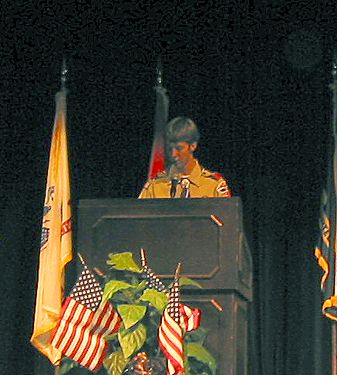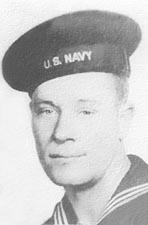 |
jacklummus.com Home Page Search Contact Us Site Map
Click the <Back> arrow to return to the previous page.
James Hamaker
Ellis County Veterans Appreciation Day, Saturday, November 12, 2005
 |
Reading the Marion R. Mitchell Story
We were sailors by Perry Giles
My name is Marion R. Mitchell. I was born in a farmhouse close to Maypearl, the son of Wesley and Flora Mitchell. There were eight of us children, and we all helped out with the farm chores.
We moved to Avalon when I was 14 and I attended high school there at Avalon, but I always worked to help out my family. We didnít have much in the way of possessions, but we got along. Our entertainment consisted of a trip to the big city of Italy and occasionally up to the Courthouse Square.
I married Ora B. Abbott of Italy in 1936 and got a job working at a dairy in Ft. Worth. We didnít have a lot, but we had each other. All in all, life was good. I guess you could say that times were simpler back then.
After the war started, all of the Mitchell brothers talked about joining up, you know, doing our part. I had one brother in the Army, one in the Air Force, and one in the Marine Corps. So naturally I decided on the Navy.
I volunteered in the fall of í42 and went to boot camp at the Great Lakes Naval Training Station in Illinois. It was sure a strange environment up here on the Great Lakes; after all, I had spent my whole life on the farm and in towns like Maypearl, Avalon and Italy. After boot camp, I received a 10-day furlough and came home for a visit. I have to say, it was harder to leave home that second time. After reporting back for duty, they sent me to Naval Station Norfolk in Virginia for more training.
Among other things, I was trained as a Naval Armed Guard to serve on board a merchant ship. It looked like we were going to be doing convoy duty across the North Atlantic. They assigned me to the M.S. Sunoil, a merchant oil tanker. It was 9000 tons, not too big, but all the same, that was a lot of fuel oil to riding on top of.
We had gun placements on the deck, mostly 50-caliber machine guns. There were sixteen of us sailors in the Armed Guard. Our tanker had a crew of 43 merchant mariners. We loaded up with 102,000 barrels of fuel oil and headed for the rendezvous point in Nova Scotia.
Between the sixteen of us sailors, we manned our gun tubs around the clock. There was much anticipation, mixed with a good dose of anxiety. We knew that the North Atlantic was no cakewalk. We had read the papers.
We arrived at Halifax, Nova Scotia and formed up with dozens of other merchant ships, tankers and Liberty ships. Some of them carried zinc ore and some carried wheat. Others were loaded full of ammunition. It seemed the British needed just about everything to stay alive in this war.
There was also an escort of British destroyers, signified as the B-7 group, and we were mighty glad to see them come along. Those destroyer escorts could make speed and they could fight. No German submarine wanted to see them along with us.
It was really quite a sight, nothing like I had ever witnessed before. This was officially called Convoy HX-231 and our destination was to be Northern Scotland, the Clyde Estuary. There were sixty-one ships in all, as we steamed out of port and headed for the war, out into the fog and the cold North Atlantic. It was late March 1943.
Although we were all a little up-tight, nobody wanted to show it. We knew that there were going to be U-boats out there, but with this many ships bunched all together, we felt better about our chances. In fact, it was hard to figure how Hitler would ever win this war, what with so many men, arms and supplies being sent over to the British Isles in these convoys.
We cleaned our 50-Cal and our binoculars. We watched and we waited. Besides watching the water for a periscope, the main objective here was staying dry and staying warm. The sea grew awful rough, there was constant rolling and pitching about, just the nerves alone were enough to make one sick. To say it was miserable would be an understatement.
On April 1st the convoy changed course, swinging to the Northeast, toward Iceland. At least we still had air cover, but that would only last another day and a half. After we cleared the Grand Banks and St. Johnís, Newfoundland, it wasnít long before the ship began to ice up. Cold, oh man, it was cold!
We were the last ship in the fourth column, on the left-hand side of the convoy. April 3rd, we were now outside the range of any air cover, in the black hole between Newfoundland, Greenland and Iceland. We knew the enemy below was here somewhere but we hadnít seen them yet. It felt really lonely here at the back edge of the convoy.
Late on Sunday the 4th there developed a heavy fog and the visibility was very poor. The seas calmed and it was eerily quietÖ Thatís when it started. There was word that U-boats had been spotted and we could hear the destroyers, HMS Alisma and HMS Vidette going after them and attacking.
Early in the morning hours, our ship the Sunoil started having engine problems. It didnít take long before we could see that the convoy was pulling away from us in the dark. We were falling behind!
When first light came, we could see the terrible truth. We were all alone. Still moving but not near fast enough. A distress signal was sent. The escorts came back just far enough to check on us, but they couldnít stay, their duty was to stay with the main body of the convoy. As fate had fallen on us, it seemed as we were about to be on our own.
At 0530 there was a periscope spotted out there in the distance. One of the destroyers came back and made a run at it, forcing the U-boat to dive. Our ship began zigzagging; it was now our only hope. During the next couple of hours we all had time to reflect, to remember, to curse and to pray. Everyone knew the score.
At 0745 we spotted the wakes of three torpedoes in the water. The ship turned violently trying to miss them. We bracedÖ Then Boom! Weíre Hit!
I was knocked down flat onto the steel deck, and then the geyser of dirty water sprayed down over us. Stunned, my ears ringing, I couldnít hear and my clothes all wet.
To my surprise the ship didnít blow up and we were still making headway. There was only one hit. The other two torpedoes had missed. Then we saw the U-boat begin to surface and that dark conning tower slowly rose up out of the sea. It was the U-563, and they were surfacing for a kill shot!
We let loose on it with everything we had, and shot it up good with our 50-Cal, my adrenaline was running really fast. Anyway, it must have worked because the sub dove again right away.
We kept zigzagging and trying to follow in the direction of the convoy, but now we were only making 7 knots. At 1235 we spotted another periscope and sent another distress signal, but that threat eventually passed. Our zigzagging must have been working, for now, but we suspected that the convoy up ahead of us had run right into a wolfpack of U-boats.
We manned our guns all day, watching, straining our eyes against the sea and the cold. Waiting for the inevitable, we passed the time cleaning the ice from our guns. Down below, the crewmembers worked desperately to repair the engines and the flooding. There was not much despair, only resolve.
Time seemed to slow down. This was the longest day. I recall thinking what I wouldnít give to be back walking down Main Street in Italy with my wife again. The sun was now going down, the frozen sea spray was still stinging but I really didnít think about the cold anymore.
Everyone was on edge. We expected they would come. When darkness fell, it didnít take long before they moved in on us. We knew they were out there, but we couldnít see a thing.
Without warning there was a big jolt and explosion, as debris and water rained down from above, there was another explosion, and then a third. Our ship went dead in the water, the radio room was now gone. There would be no distress call sent this time. The Sunoil was on fire and breaking up.
It was Monday the 5th of April 1943.
Nobody came to help us. There were fifty-nine of us.
Remember us, for we were sailors once and young.
 |
Veterans Appreciation Day 2005
The above story appeared in the Ennis Daily News and Waxahachie Daily Light during the week of Veterans Day.
*Editor's note: Perry Giles, in his unforgettable way, has given voice to many of our local fallen heroes. Through countless hours of research and interviews with family members and friends, he pieces together the events, thoughts and feelings of those who have sacrificed everything so that we may live in peace and freedom.
*Ennis Daily News
The story is courtesy of Perry Giles, Giles Monument Company, Waxahachie, Texas.
A shortened version of the newspaper article was read at the Ellis County Veterans Appreciation Day ceremony.
Click the <Back> arrow to return to the previous page.
© 1999-2007 Utility Press Inc. All rights reserved.